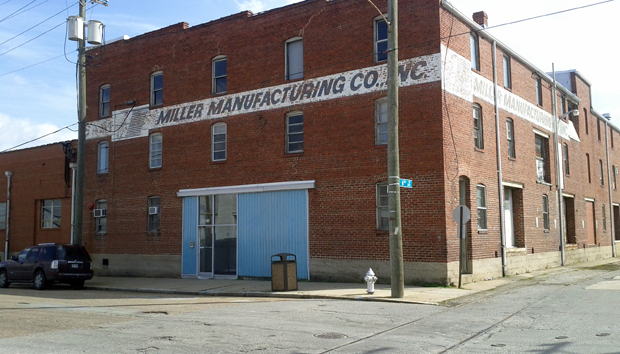A Manchester developer is betting on affordable housing to fill up a 197-apartment project.
Fountainhead Properties will convert the Miller Manufacturing property into so-called low-income housing, meaning that there will be income-based restrictions on who can live in the planned $26 million development.
“What this will be is workforce housing,” said Fountainhead principal Tom Papa. “The phrase ‘low income’ is unfortunate, because these people have jobs. A lot of people confuse low income with Section 8, and that’s not what we’re doing.”
The Miller Manufacturing complex is 180,000 square feet and takes up two city blocks between Fifth and Sixth streets and Everett and Decatur streets in Manchester.
Papa said Fountainhead chose to go the low-income direction because financing for the project was less expensive and because the company thought demand for such units at Miller was greater than for market rate apartments.
This route also allows the developers to qualify for tax credits from the federal low-income housing tax credit program, in addition to applying for state and federal historic tax credits.
Under the low-income housing tax credit program, Richmond Redevelopment & Housing Authority will act as a conduit to issue tax-free bonds to finance the construction costs for Bank of America, the lender on the Miller development. This allows Bank of America to offer Fountainhead a low interest rate on the loan.
The program that Fountainhead is using is designed to encourage developers to build affordable housing units by providing an approximately 30 percent tax credit for eligible developments. Developers must to agree to rent and income restrictions for residences for up to 30 years.
That’s in addition to the up to 45 percent projects can receive in state and federal historic tax credits. The tax credits are sold to project investors based on market rates, which fluctuate. Investors can use those credits toward their tax burdens.
Fulton Bank will buy into Fountainhead’s Miller project as an equity investor, making it eligible to receive the tax credits.
For Miller Manufacturing, money from historic tax credits and the low-income tax credits combined might offset more than 50 percent of the costs of the Miller project, Papa said.
As for the rent restrictions on the property, Fountainhead principal Rick Gregory said rent in a qualified low-income housing tax credit project is about 75 to 80 percent of market rate.
The income restrictions for tenants range from an annual income of $28,000 for an individual to $60,000 for a family of four, Gregory said.
“These are not poor people,” he said. “In one of our market rate projects, we have 40 people living there that would qualify for LIHTC apartments. This gives us an opportunity to tap into a bit of a different demographic and make housing a little more affordable.”
Gregory said the Miller development would be built to the same standards as the firm’s other apartment projects.
“When Fountainhead builds a LIHTC project, we do everything exactly the same as we’d do in a market rate project,” he said. “We can just charge less because we have this infusion of equity from the low-income tax credits, meaning we have to borrow less money.”
Construction is set to kick off at the site at 500 Stockton and 510 Decatur streets in July, he said. It should be completed in mid-2014. KBS is the general contractor. The bonds through RRHA now await final approval from city council.
Fountainhead is also developing a market rate project called South Canal, which is also slated to kick off this summer. The 93-unit waterfront project at the southern end of the 14th Street Bridge will cost about $15 million.
A Manchester developer is betting on affordable housing to fill up a 197-apartment project.
Fountainhead Properties will convert the Miller Manufacturing property into so-called low-income housing, meaning that there will be income-based restrictions on who can live in the planned $26 million development.
“What this will be is workforce housing,” said Fountainhead principal Tom Papa. “The phrase ‘low income’ is unfortunate, because these people have jobs. A lot of people confuse low income with Section 8, and that’s not what we’re doing.”
The Miller Manufacturing complex is 180,000 square feet and takes up two city blocks between Fifth and Sixth streets and Everett and Decatur streets in Manchester.
Papa said Fountainhead chose to go the low-income direction because financing for the project was less expensive and because the company thought demand for such units at Miller was greater than for market rate apartments.
This route also allows the developers to qualify for tax credits from the federal low-income housing tax credit program, in addition to applying for state and federal historic tax credits.
Under the low-income housing tax credit program, Richmond Redevelopment & Housing Authority will act as a conduit to issue tax-free bonds to finance the construction costs for Bank of America, the lender on the Miller development. This allows Bank of America to offer Fountainhead a low interest rate on the loan.
The program that Fountainhead is using is designed to encourage developers to build affordable housing units by providing an approximately 30 percent tax credit for eligible developments. Developers must to agree to rent and income restrictions for residences for up to 30 years.
That’s in addition to the up to 45 percent projects can receive in state and federal historic tax credits. The tax credits are sold to project investors based on market rates, which fluctuate. Investors can use those credits toward their tax burdens.
Fulton Bank will buy into Fountainhead’s Miller project as an equity investor, making it eligible to receive the tax credits.
For Miller Manufacturing, money from historic tax credits and the low-income tax credits combined might offset more than 50 percent of the costs of the Miller project, Papa said.
As for the rent restrictions on the property, Fountainhead principal Rick Gregory said rent in a qualified low-income housing tax credit project is about 75 to 80 percent of market rate.
The income restrictions for tenants range from an annual income of $28,000 for an individual to $60,000 for a family of four, Gregory said.
“These are not poor people,” he said. “In one of our market rate projects, we have 40 people living there that would qualify for LIHTC apartments. This gives us an opportunity to tap into a bit of a different demographic and make housing a little more affordable.”
Gregory said the Miller development would be built to the same standards as the firm’s other apartment projects.
“When Fountainhead builds a LIHTC project, we do everything exactly the same as we’d do in a market rate project,” he said. “We can just charge less because we have this infusion of equity from the low-income tax credits, meaning we have to borrow less money.”
Construction is set to kick off at the site at 500 Stockton and 510 Decatur streets in July, he said. It should be completed in mid-2014. KBS is the general contractor. The bonds through RRHA now await final approval from city council.
Fountainhead is also developing a market rate project called South Canal, which is also slated to kick off this summer. The 93-unit waterfront project at the southern end of the 14th Street Bridge will cost about $15 million.






Great! Finally some mixed income housing in all this terrific development downtown! Thanks!
Thx for the story Michael
There are all kinds of people that can benefit from this kind of housing and be a positive part of the community. Great work.
Its time that the LIHTC stigma is erased completely and the first step would be to rename it as Work Force HTC. Local residents who oppose the Low Income designation would support the Work Force designation. Miller Manufacturing and Belle Summit (under construction at the Lee Bridge) will be two Manchester LIHTC jobs coming this year and both will be very successful, providing over two hundred apartments for working families. Mssrs Papa and Gregory are to be congratulated.
Manchester Lofts and the new development on Perry are also mixed-income developments. The rest of the city needs to follow suit…
I think this is an unfortunate turn of events; Both Belle and Manchester. These projects are artificially suppressing the marketability of these areas for any future retail development. The income level of the area is now lowered. Every retailer looks at these figures when determining where to locate. Don’t expect Martins, think Food Lion. Dollar tree, not 5 and below as a result. Subsidized housing should be distributed equally across the region, not concentrated. The 1950s and 60s taught us that. Richmond is still crippled by those experiments. Dont repeat.